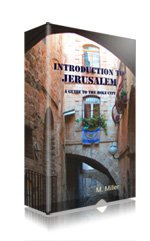Ancient Hebrew Script
Rashi Script
An ancient Hebrew script you may come across is Rashi script, named in honor of the greatest of all Jewish commentators, Rabbi Solomon Yitzhaki, who lived in 11th century Troyes.
Rashi (an acronym of his initials) did not actually use Rashi script, but to this day, his commentaries on the Bible and Talmud are printed in this script.
This type of Hebrew writing is a little harder to decipher if you’re used to block Hebrew letters (Ktav Ashuri). The truth is, you're not likely to need Rashi script on a visit to Jerusalem unless you want to learn Hebrew to study the Biblical commentaries, but it sure is fun to learn.
Rashi wrote the first comprehensive commentary on the Hebrew Bible and Talmud. His commentary has been printed next to the Talmudic text in every edition since the Talmud was first set on a printing press in the 1520s. In order to differentiate Rashi’s commentary from the Talmudic text, printers used a different font, one patterned after a Sephardic cursive version of an ancient Hebrew alphabet that was then called "Provincial script".
The custom of using this font for Rashi’s commentary continues to this day and, over time, the font itself became known as Rashi script.
If you’re interested in learning Rashi script, this site has a free Rashi Reading Crash Course, with some flashcards for letters and words, as well as reading and writing practice pages.
Here's what Rashi script looks like:

Return from Ancient Hebrew Script to Hebrew Phrases.
Return to Hebrew Alphabet Chart
Return to Learn to Speak Hebrew page.
Return to Jerusalem home page.
Hebrew Study Resources:
- Learn to speak Hebrew
- Hebrew phrases
- Hebrew alphabet chart
- Hebrew numerology
- Ancient Hebrew alphabet
- Hebrew for kids - resources for Hebrew language study
Top 5 Jerusalem Hotels
Click here for the top 5 discount hotels in Jerusalem.
Take us with you!
Download our guidebook, Introduction to Jerusalem: A Guide to the Holy City and you'll know:
- what to pack
- when to come
- what not to miss
- where to change money
- how to get around






New! Comments
Have your say about what you just read! Leave me a comment in the box below.